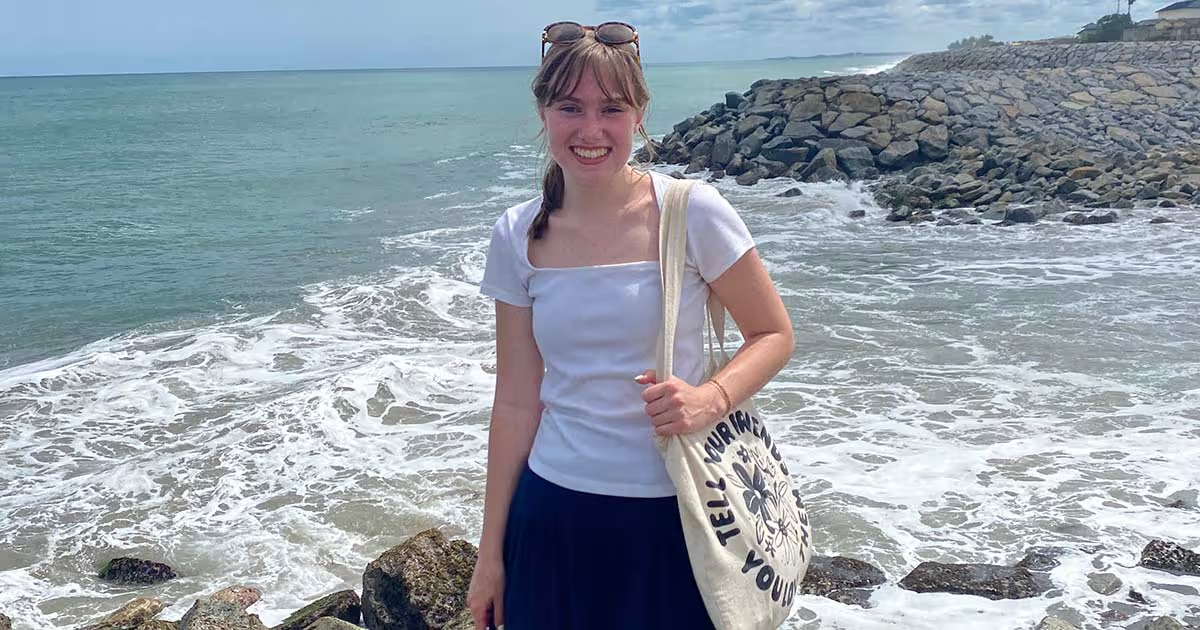Olivia Faith Rogers grew up in a place where getting a sick child to the pediatrician meant a 45-minute drive from the south end of Erwin.
“When your child is sick, the last thing you should be worried about is driving almost an hour to get them help,” said Rogers, a senior at East Tennessee State University majoring in biomedical health sciences with a culture and health minor. “This issue is what inspired me to pursue medicine. My goal is to bridge this gap and be a pediatrician for my hometown.”
That mission has only intensified since Hurricane Helene devastated her community, flooding the local hospital and trapping over 50 people on the roof. That included some of her former coworkers.
“It was devastating to look around and see the places I grew up completely destroyed,” she said. “Our community, however, was not destroyed.”
A first-generation student goes global
Before coming to ETSU, Rogers had never been on a plane or traveled more than a few hours from home. As a first-generation college student, she faced the daunting task of navigating financial aid applications, course selection and medical school preparation without a family roadmap.
“I had no idea how to apply for financial aid, what courses to take, or what extracurriculars would make me a competitive applicant for medical school,” Rogers said.
She found support through the Ayers Foundation at her high school and quickly applied to become a Quillen Honors Scholar at ETSU.
It’s a decision that opened doors she never imagined.
Rogers has visited Canada, England, Scotland, Italy and Ghana. She’s served as a peer mentor for Native American students from North Carolina and Roma students from Hungary. She’s led alternative spring break trips, focused on hurricane relief and learned to navigate cultures far different from her own.
Culture as medicine
Rogers’ journey exemplifies the value of ETSU’s culture and health minor. It’s an interdisciplinary program that explores how cultural, historical, social and ethical forces shape health care experiences.
“The culture and health minor has been a great asset to me as I pursue rural medicine,” Rogers said. “This minor has taught me about a wide range of cultures, from local Appalachian culture to the Hmong culture, and how culture impacts health and medicine.”
Dr. Melissa Schrift, associate dean of the Honors College and professor of anthropology at ETSU, considers Rogers as an ideal example of what the program can accomplish.
“The culture and health minor helps students develop cross-cultural communication skills and cultural humility essential for providing compassionate, effective health care,” Schrift said. “Students like Olivia learn to work across cultures, communicate with empathy, and think critically about the human side of medicine – skills that make them stand out whether they’re applying to medical school or preparing for careers in community health.”

Lessons in resilience and advice for the journey
Rogers’ travels have shown her that small communities separated by oceans often share the same struggles and the same determination to overcome them.
“Ideas and knowledge can be shared across regions and cultures to solve a common issue,” she said. “East Tennessee and Hungary don’t seem like they would have many similarities, but they do.”
Some of her most powerful lessons came from home.
In March, she co-led an alternative spring break trip focused on hurricane relief following the devastation of Hurricane Helene.
“I heard repeatedly of people saying, ‘I'm okay, but my neighbor needs help,’” Rogers said.
Rogers offers simple but hard-won advice for other first-generation students beginning similar journeys. “You should not have to decipher these complicated processes alone,” she said. “It is also important to remember everyone’s path is different. You may go through your journey at a quicker or slower pace than someone else on a similar path.”
ETSU aims to offer a wide range of support to students, including those who are the first in their families to attend college. Earlier this year, ETSU launched the Mary V. Jordan Center, a comprehensive support hub designed to guide students from application to career placement.





.jpg)